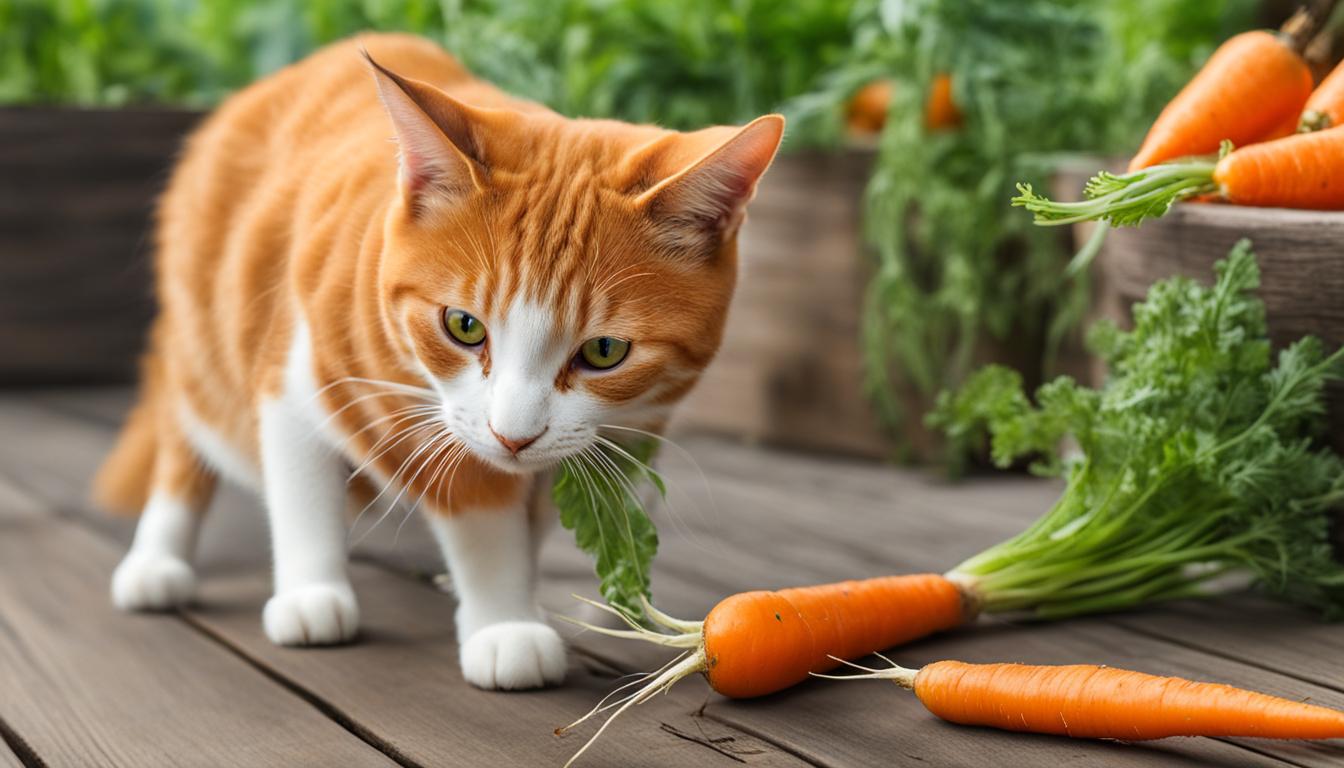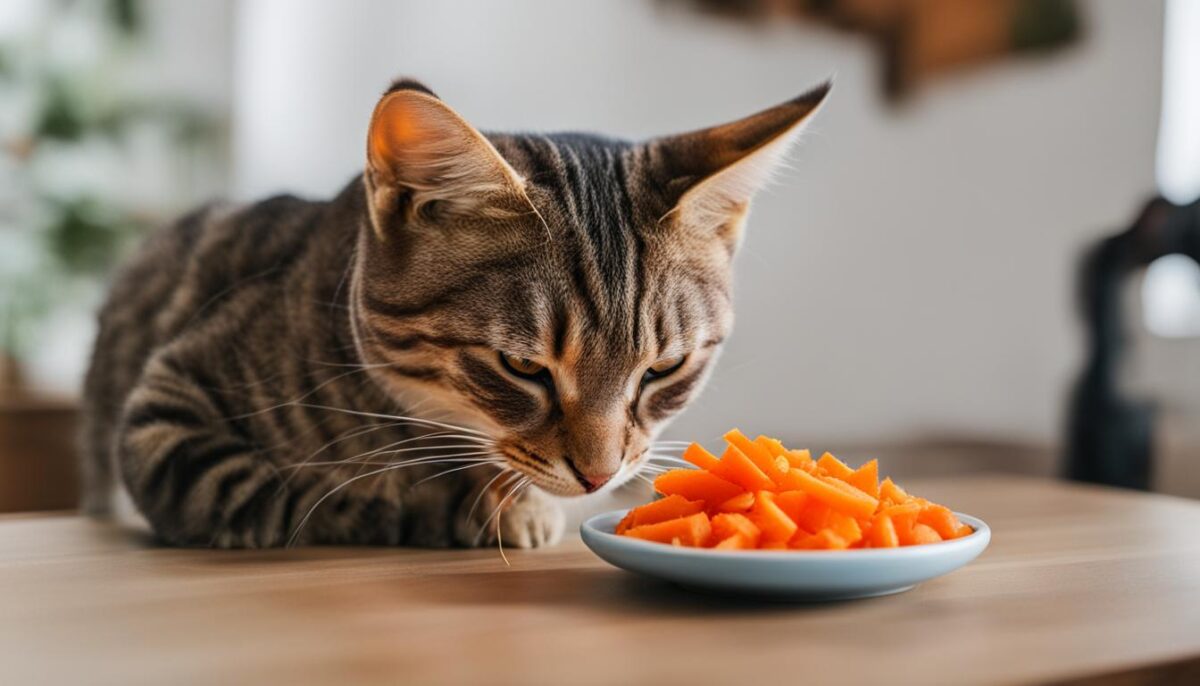Are you wondering if cats can eat carrots? If so, you’re not alone! Many cat owners are curious about whether this crunchy vegetable is safe for their feline friends. In this article, we’ll explore the topic of cats and carrots, discussing whether carrots are a suitable snack for our whiskered companions.
The Health Benefits of Carrots for Cats
Carrots offer several health benefits for cats, thanks to their nutritional content. These vibrant vegetables are packed with essential nutrients that contribute to the overall well-being of your feline friend. Here are some key health benefits that carrots provide for cats:
- Antioxidants: Carrots are rich in antioxidants such as beta-carotene, which helps support your cat’s immune system and protects against cell damage.
- Vitamins and Minerals: Carrots contain vitamins K and E, as well as minerals like manganese, potassium, magnesium, phosphorus, and zinc. These nutrients contribute to various bodily functions and help maintain optimal health.
- Fiber: The dietary fiber in carrots can promote healthy digestion and regular bowel movements in cats.
While it’s important to note that cats are obligate carnivores and require a meat-based diet for their essential nutrients, incorporating small amounts of carrots into their diet can offer these additional health benefits. However, it’s crucial to provide carrots as a supplement rather than a primary source of nutrition.
The Nutrients in Carrots for Cats
Carrots are a nutrient-dense vegetable that can provide cats with a range of essential vitamins and minerals. Here are some nutrients found in carrots and their benefits for cats:
| Nutrient | Benefits for Cats |
|---|---|
| Beta-carotene | Supports the immune system and promotes healthy eyesight in cats. |
| Vitamin K | Aids in blood clotting and helps maintain bone health. |
| Vitamin E | Acts as an antioxidant, protecting cells from damage. |
| Manganese | Contributes to the metabolism of proteins and carbohydrates. |
| Potassium | Helps regulate fluid balance and supports proper muscle function. |
| Magnesium | Plays a role in nerve function and helps maintain healthy bones. |
| Phosphorus | Essential for bone and teeth formation in cats. |
| Zinc | Supports a healthy immune system and aids in wound healing. |
| Dietary Fiber | Promotes digestive health and helps prevent constipation in cats. |
These nutrients work together to support your cat’s overall health and well-being. However, it’s important to remember that carrots should always be served in moderation and as part of a balanced diet.
Are Carrots Good for Cats?
Yes, carrots can be good for cats when served in the right way. While they should not replace a meat-based diet, carrots can provide cats with additional nutrients and health benefits. Just remember to serve them as a supplement to their regular meals and in small, bite-sized pieces to prevent choking hazards. Cooked carrots are recommended for easier digestion, and it’s important to avoid adding any seasonings or harmful ingredients like butter, garlic, or onions.
Safe Ways to Serve Carrots to Cats
When it comes to offering carrots to your feline friend, it’s important to take certain precautions to ensure their safety and well-being. Here are some safe ways to serve carrots to cats:
Cooked Carrots for Cats
Cooking carrots before serving them to your cat is advisable as it helps make them easier to digest. You can boil, steam, or bake carrots for your cat, but be sure to avoid adding any seasonings or harmful ingredients such as butter, garlic, or onions. Plain, cooked carrots are the best option for your feline companion.
Raw Carrots and Potential Hazards
While raw carrots are safe for cats to consume in small amounts, there are a few potential hazards to be aware of. Raw carrots can be challenging for cats to digest and may present a choking hazard, especially if they are not sliced into small, bite-sized pieces. To minimize any risks, it’s best to stick to cooked carrots as mentioned earlier.
Remember, it’s always important to monitor your cat’s reaction to any new food you introduce, including carrots. If you notice any signs of discomfort, digestive issues, or allergic reactions, it’s best to consult with a veterinarian for further guidance.
Overall, carrots can be a healthy snack for cats when served in moderation and prepared correctly. They should never replace the essential protein-based diet that cats require. By following these safe serving methods, you can provide your furry friend with a nutritious and enjoyable treat.
| Serving Method | Safety Precautions | Benefits |
|---|---|---|
| Cooked Carrots | Avoid adding seasonings or harmful ingredients. | Easier to digest and safe for cats. |
| Raw Carrots | Slice into small, bite-sized pieces to prevent choking hazards. | Can be consumed in small amounts, but not recommended due to digestion challenges. |
It’s crucial to prioritize your cat’s well-being and consult with a veterinarian before introducing any new foods into their diet. By understanding the best practices for serving carrots to cats, you can safely incorporate this nutritious vegetable into their occasional snack repertoire.
Conclusion
In conclusion, it is safe for cats to eat carrots in moderation, as long as they are served and prepared correctly. Carrots can offer some nutritional benefits, but they should not be a substitute for a balanced diet of meat, which is essential for cats. To ensure your feline friend’s well-being, it is always best to consult with a veterinarian before introducing any new foods into their diet.
Summary of Feeding Carrots to Cats
Carrots are rich in nutrients such as fiber, vitamins, and minerals, which can be beneficial for cats. However, it’s important to remember that cats are obligate carnivores, and their primary source of nutrition should come from meat. Therefore, carrots should only be given as an occasional snack and not as a staple in their diet.
Guidelines for Feeding Carrots to Cats
When serving carrots to your cat, it is advisable to cook them first. Raw carrots can be difficult for cats to digest and may pose a choking hazard. Cooked carrots can be boiled, steamed, or baked, but make sure not to add any seasonings or ingredients that could be harmful to your cat, such as butter, garlic, or onions. It’s also important to slice the cooked carrots into small, bite-sized pieces to minimize the risk of choking.
Key Takeaways
Remember the following key guidelines when it comes to feeding carrots to your cat:
- Offer carrots as an occasional snack and not as a substitute for a meat-based diet.
- Cook the carrots before serving to improve digestibility and reduce the risk of choking.
- Avoid adding any seasonings or harmful ingredients to the cooked carrots.
- Consult with a veterinarian before introducing new foods to your cat’s diet.
By following these guidelines, you can safely provide your cat with a healthy and varied diet that includes the occasional carrot treat. However, always remember that cats have specific dietary needs, and it’s important to prioritize their nutritional requirements.
FAQ
Can cats eat carrots?
Yes, cats can eat carrots in small amounts.
Are carrots safe for cats?
Yes, carrots are safe for cats to eat as long as they are served in moderation and cooked properly.
What are the health benefits of carrots for cats?
Carrots provide several beneficial nutrients for cats, including beta-carotene, vitamins K and E, manganese, potassium, magnesium, phosphorus, zinc, dietary fiber, and folate. These nutrients can support the immune system, promote healthy digestion, and contribute to overall well-being.
How should I serve carrots to my cat?
It is recommended to cook carrots before serving them to cats. Raw carrots can be difficult to digest and may pose a choking hazard. Cooked carrots can be boiled, steamed, or baked, but avoid adding any seasonings or harmful ingredients. Slice the cooked carrots into small, bite-sized pieces to reduce the risk of choking.
Can cats have raw carrots?
It is safer to serve cooked carrots to cats as raw carrots can be challenging to digest and may pose a choking hazard.
Can cats eat carrots as a substitute for their meat-based diet?
No, cats are obligate carnivores and require meat for their essential nutrients. Carrots should only be offered as an occasional snack and should not replace a balanced diet of meat.
What other vegetables can cats eat?
Cats can also eat vegetables such as zucchini, celery, spinach, peas, pumpkin, green bell peppers, and sweet potato. However, it is important to consult with a veterinarian before introducing any new foods to a cat’s diet.

